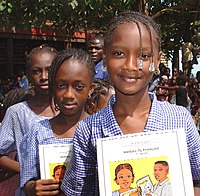
Photo from wikipedia
Intersections of gender, migration, and literature—specifically life writing— are a site of inquiry in my research and teaching. I am a German immigrant who came to the US on a… Click to show full abstract
Intersections of gender, migration, and literature—specifically life writing— are a site of inquiry in my research and teaching. I am a German immigrant who came to the US on a student visa and changed her status to permanent resident through a marriage-based green card. From the beginning of my teaching career, I noticed that only a few of my students had any understanding of migration issues in the US, let alone globally. Their initial perceptions of migrants were steeped in stereotypical constructions, which seemed to complement the gap I had identified in academic research regarding the life writing of immigrant women, especially women of non-European descent. While contemplations of the connection between migration and social justice are always worthwhile, recent political events have made them urgently essential. When I received the opportunity to create a Women’s and Gender Studies (WGS) course with a focus on women writers, I decided to combine the literary analysis of four immigrant women’s memoirs with a semester-long service-learning project that asked students to interact with immigrant communities. I use the term “service learning” to denote meaningful service connected with education, reflective exercises, and civic engagement, with the aim of supporting communities and creating long-term social change. In this essay, I elaborate on how I employed a service-learning assignment to motivate my students to think deeply about the connections between gender, migration, and life writing, and to see the value of life stories as a socialjustice tool in a time of global turmoil and unprecedented movements of people. Bringing together life writing, service, and WGS created unique outcomes for this course: the students were able to engage more deeply with the genre when they received the chance to work with the communities that the memoirs they read described; immersing themselves in migrant narratives (both in print and in person) facilitated a more intense understanding of core lifewriting and feminist concepts and theories; it brought to life the issues that
Journal Title: a/b: Auto/Biography Studies
Year Published: 2018
Link to full text (if available)
Share on Social Media: Sign Up to like & get
recommendations!